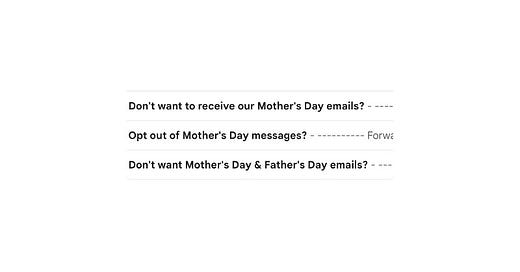Embedded is your essential guide to what’s good on the internet, written by Kate Lindsay and edited by Nick Catucci.
The podcast Minion Death Cult did its own take on “the war on Mother’s Day emails.” Listen here! —Kate
I never think about my mom dying more than I do on Mother’s Day. To be clear: My mom is, thankfully, alive and well. But in recent years, as users on social media have become more and more aware of their audiences and attempt to be inclusive of every possible person viewing a post, Mother’s Day, ironically, has become more fraught online. Many people posting about the holiday simultaneously feel the need to reassure anyone who might feel triggered because they don’t have a mother or a child to celebrate. As a result, the average Instagram Stories viewer winds up having to tap through an image like this over and over again:
I take no issue with the post itself. Instead, I’m struck by the ubiquity of this kind of message and what it means about how we behave online—the way that social media has nudged us to adopt the responsibilities and considerations of public figures even if we’re not. But forget all that, because now the brands are doing it.
In the weeks leading up to May 14, I’ve received a slew of somber emails from brands acknowledging that this day might be hard for me and giving me the option to opt out of whatever offer they’re about to send me for a monogrammed pair of wine glasses. I assume that when a brand does this, they hope to gain in kudos what they presumably lose in sales.
Well-intended as it may be, “dead mom” marketing rubs me the wrong way, especially because it results in the exact thing the brand is claiming to help recipients avoid: an inbox full of emails that remind them of their dead mom (or estranged mom, or lost child). It’s also, according to author Leah Carroll, “totally backward and pandering.”
Leah is the author of Down City: A Daughter's Story of Love, Memory and Murder, a memoir about her mother being killed when Leah was four and her dad’s death when she was 18. She is also my former coworker, current friend, and Nick’s wife, so I felt comfortable calling her up last week to get her perspective on the feelings I was having. Basically, I wanted to know: Am I the jerk for resenting this marketing?
Leah realizes that her opinions are her own and don’t necessarily reflect those of all grieving children, and acknowledges that she’s had more time to grieve her mother than many others. But she feels that brand emails like these are “actually reinforcing the notion that talking about people who are dead is bad or weird.”
“You can't opt in and out of grief,” she says. “It’s not like opting out of brand emails is going to stop you from grieving your mom on Mother’s Day.”
Instead, Carroll sees Mother’s Day as a rare opportunity to acknowledge what brands erroneously assume should go unsaid.
“People miss their moms and dads, and we don't have a way to talk about death unless they just died or it's the anniversary,” she says. “And these holidays actually give people more of a chance to talk openly about dead parents.”
But what about those Instagram Story posts? The ones that force me to think about my mother’s eventual death slide after slide after slide?
First off, she says, while that may be uncomfortable for me, it is actually a good thing.
“Everyone's mother dies,” she continues. “We like to pretend that that is not the case.”
And for those who do have mothers who have passed away, she says the acknowledgment is a nice gesture.
“In general I’m a fan of sincere acknowledgment of other people’s pain,” she texted me in a follow-up to our conversation. Which is why people like me, and the brands in my inbox, shouldn’t attempt to stifle it.
In any case, she says, “if DoorDash wants to send me 20 percent off on Mother's Day, I'm gonna be like, ‘Sweet.’”






